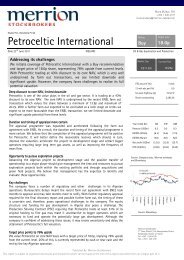Quarterly Bulletin Q3 2013
Quarterly Bulletin Q3 2013
Quarterly Bulletin Q3 2013
You also want an ePaper? Increase the reach of your titles
YUMPU automatically turns print PDFs into web optimized ePapers that Google loves.
EU-IMF Financial Assistance Programme<br />
– Tenth Review<br />
<strong>Quarterly</strong> <strong>Bulletin</strong> 03 / July 13<br />
73<br />
In addition, the Bank published the revised<br />
CCMA 7 , which came into effect from 1 July<br />
<strong>2013</strong>. Amendments to the code include<br />
greater clarity on when a borrower is<br />
considered to be cooperating, the introduction<br />
of communication policies approved by the<br />
boards of the lenders to ensure that borrowers<br />
are protected against unnecessarily frequent<br />
contacts and harassment, and the removal of<br />
the current monthly cap on unsolicited<br />
successful contacts. Lenders are also<br />
permitted to offer arrangements to distressed<br />
mortgage holders that provide for the removal<br />
of tracker rates, as a last resort, in cases where<br />
there is no other sustainable option available<br />
and the only alternative is repossession. The<br />
arrangement offered must be a long-term,<br />
sustainable solution that is affordable to the<br />
borrower. In addition, cooperating borrowers<br />
must now be given at least eight months from<br />
the date arrears first arise before legal action<br />
can commence and, at the end of the<br />
Mortgage Arrears Resolution Process (MARP),<br />
lenders will be required to provide a newly<br />
introduced three-month notice period to allow<br />
co-operating borrowers time to consider their<br />
options, such as voluntary surrender or an<br />
arrangement under the Personal Insolvency<br />
Act (once available), before legal action can<br />
commence.<br />
The Bank has also developed non-public<br />
individual bank targets for SME distressed debt<br />
restructuring, which it issued to the relevant<br />
banks in June. Along with tracking banks’<br />
progress with the KPIs, it is maintaining its<br />
focus on strengthening the operational<br />
capacity of the banks so that they can deliver<br />
durable solutions.<br />
In the area of provisioning, the Bank has been<br />
engaging with each bank to ensure an<br />
appropriately conservative treatment. It<br />
published updated impairment provisioning<br />
and disclosure guidelines at the end of May 8 ,<br />
which will inform the development and<br />
application of the covered institutions’ 9<br />
impairment provisioning frameworks. The<br />
Bank’s work in this area drew, amongst other<br />
things, on a review of the implementation of<br />
the 2011 Guidelines by the covered banks.<br />
The Bank reported to the External Partners on<br />
the evolution of regulatory capital within the<br />
PCAR banks up to the end of December 2012,<br />
at the end of May.<br />
Two new structural benchmarks have also<br />
been proposed, namely to undertake a<br />
forward-looking analysis of operating profits for<br />
the PCAR banks to the end of 2015 (by end-<br />
September) and a preliminary balance sheet<br />
assessment (by end-October). The latter will be<br />
finalised by end-November, and will consist of<br />
an asset quality review and a review of the<br />
appropriateness of banks’ risk-weighted asset<br />
(RWA) calculations for determining regulatory<br />
capital requirements. This work will form part of<br />
the preparations for the bank stress test. The<br />
timeline for this was previously linked to that of<br />
the EU-wide European Banking Authority (EBA)<br />
stress test. However, in light of the evolving<br />
calendar of the next EU-wide bank diagnostic<br />
exercises, in the lead-up to the Single<br />
Supervisory Mechanism (SSM), it has been<br />
agreed to modify the stress test timeline under<br />
the programme. A stress test of the Irish<br />
banking sector will now be conducted ahead<br />
of, but in close proximity to, the EU-wide<br />
exercise in 2014.<br />
Other work to be progressed over the coming<br />
months includes an exploration of options to<br />
lower the cost of banks’ tracker mortgage<br />
portfolios, a comparative assessment of banks’<br />
fee income and an external review of the<br />
regulation of these fees. An analysis of current<br />
eligible regulatory capital under Basel III/the<br />
Capital Requirements Directive IV (CRD IV) will<br />
also be undertaken.<br />
The Central Bank (Supervision and<br />
Enforcement) Act <strong>2013</strong>, has been enacted.<br />
This will strengthen the Bank’s powers in a<br />
range of areas, including investigation,<br />
direction and enforcement. Steps to establish a<br />
Central Credit Register are also on-going.<br />
7 http://www.centralbank.ie/regulation/processes/consumer-protection-code/Documents/<strong>2013</strong>%20CCMA.pdf<br />
8 http://www.centralbank.ie/regulation/industry-sectors/credit-institutions/documents/impairment%20provisioning%20guidelines%20<br />
may%20<strong>2013</strong>.pdf<br />
9 AIB, Bank of Ireland and Permanent TSB.




